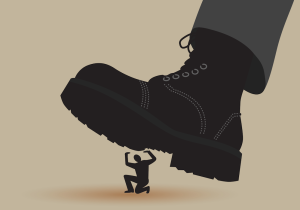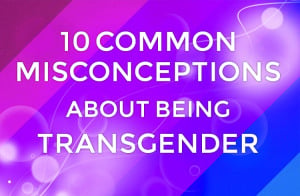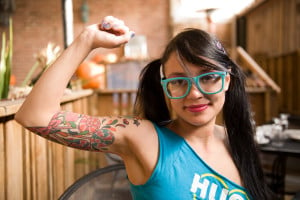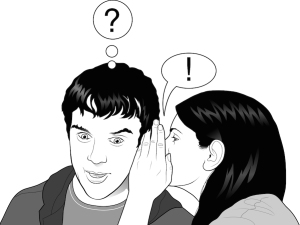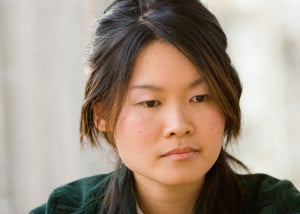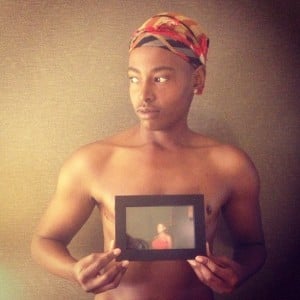
A person wearing a winter coat and red eyeglasses clings to their coat collar and smiles, gazing at something off-camera.
I often joke with people that feminism has been like a born-again religion for me – that once I found it and let it into my life, my entire perspective shifted in such a way that suddenly, everything made sense – and that I feel compelled to spread that gospel.
See, because when I first started discovering feminism, I realized how many of the bad things that have happened in my life, big and small, have been part of a larger social system. And coming to understand that it was never my fault or about me individually gave me space to start an immense healing process.
And when intersectional feminism found its way into my life, I was even more enamored: Not only did feminism explain what had gone wrong in my own life and the lives of other women, but it explained essentially every awful thing in the world.
Damn, that’s powerful.
I often encounter people who ask me and others, though, what the point of feminism is – how it’s still relevant, why it matters. And it’s easy enough to name broader accomplishments of the movement, like the right to vote and abortion access, as ways in which it affects my life, but what about the day-to-day?
Because feminism isn’t only present in my life when I’m filling out a ballot or waiting for my birth control prescription. Feminism has colored every single thought and action that passes through me in a day. Feminism has changed how I see myself and others. Feminism has rebooted my entire being.
Feminism is my operating system.
And I think that that matters, too. The name of the site is Everyday Feminism, after all.
Of course, my own experience with how feminism has changed my life in small ways is influenced by my social location. As a white, queer, able-bodied, neuroatypical, middle class, educated, cisgender woman, my relationship with feminism exists in a particular space, mostly of privilege – but I can only speak from that space.
So here are 100 ways that feminism affects my day-to-day life in seemingly small ways that add up. What would you add?
Self-Worth
1. I have more confidence.
2. I’m more comfortable with who I am as a person – and who I’m not.
3. Slowly, but surely, I’m learning to say no.
4. I’m better at simply saying thank you to a compliment.
5. I’m learning not to let my physical appearance be the most important thing about me.
6. I know that my life is important, and that I can use it to further movements for justice and liberation.
7. I’m better at recognizing that I have a voice – and when I should use it and when I should listen more.
8. I’m better able to navigate the destructive forces of my eating disorder – and to ask for help when I need it.
9. My bad body image days have turned into my feeling like a failure to my recognizing the ways in which society has failed me.
10. I know that I am deserving of the good things in my life…
11. …while also recognizing the ways in which society has unfairly given me an advantage.
12. I’m better able to recognize my privileges without feeling guilty for them.
13. I know better when my opinion is valuable (and when it isn’t).
14. I’m better at ignoring the vitriol that the trolls throw at me.
15. I’ve learned how to use exercise as a means of self-love and not self-destruction.
16. I’m no longer fooled by the allure of fitspiration.
17. I no longer “dress for my body type,” but just dress for my damn self.
18. I’m less conflicted about my choice to wear makeup.
19. I love selfies – and I’m okay with that.
20. I’m more dedicated to a self-care practice.
Love and Sex
21. I’m more comfortable with the idea that I deserve to be loved in a way that feels nourishing to me.
22. I’m pickier about who I date and sleep with.
23. I’m better able to recognize when my romantic or sexual relationships are unfulfilling or toxic.
24. When I came to learn that my relationship with an emotionally abusive partner wasn’t my fault, I was finally able to begin healing.
25. I, myself, am learning how to be less manipulative or destructive in my own relationships.
26. I know that I have a right to be upset about a partner pressuring me sexually.
27. I expect my partners to treat me with respect and to talk to me as an equal.
28. And I don’t blame myself when I end up in relationships with people who don’t.
29. I’m more comfortable with my queer identity.
30. I’m more comfortable with my queer identity not fitting neatly into a box.
31. And I’m unconcerned with people who “don’t get it.”
32. I can defend my polysexuality and make it clear to partners that no gender is, ever has been, or ever will be a “phase” for me.
33. I’m better equipped to deflect biphobia.
34. I recognize now why “Nice Guys™” always made me uncomfortable.
35. I understand now why the (explicit or implicit) blame put on me for “friendzoning” people throughout my life always made me angry.
36. I know that I don’t owe anyone my romantic or sexual attention.
37. I know that there isn’t anything cute about stalking – and why the media representations of it as such are so damaging.
38. I’m more okay with the idea of being alone – and I know that being single doesn’t make me worthless.
39. I know that it’s okay to end a relationship that no longer feels good to me – and I feel less guilty in the aftermath.
40. I’m better at recognizing and communicating my sexual needs (even if it’s still hard sometimes!).
Work and School
41. I’m slowly learning my worth in the workplace and in academia, recognizing that my talents matter.
42. I’m more comfortable stating what my needs are – whether that’s in terms of salary, support, or appropriate time off.
43. I’m less ashamed of the concept of taking a mental health day – and using sick time to do it.
44. I’m less uncomfortable asking to be recognized for my accomplishments.
45. It’s still super awkward asking to be considered for a raise or a promotion, but it’s getting easier to recognize when I’m qualified for one.
46. I expect – and rightfully so – for all genders, my own included, to be treated with equity.
47. I’m more likely to take action against sexual harassment.
48. I’m becoming more comfortable with calling myself an expert in my field.
49. I’m slowly unlearning my Imposter Syndrome.
50. I notice the ways in which patriarchy, white supremacy, and capitalism paint the picture of academia, so I’m better able to push back against it.
51. I’m better at recognizing when an opportunity isn’t appropriate for me, in all of my privileges, to grab – and guiding it to someone better suited.
52. I’m learning how to use my salary in ways that can benefit others, by choosing where to donate chunks of it.
53. I’m more comfortable in leadership positions.
54. I expect my work and school environments to be aware of inequities and to work toward creating a safer environment for people of color; queer, trans, and gender non-conforming people; and others. I’m better equipped to make demands to that effect.
55. I more clearly see microaggressions when they occur.
56. I expect the managerial leadership in a workplace to use feminist values.
57. When booking freelancing opportunities, I’m more comfortable asking for the amount of money that makes it feel worthwhile to me.
58. I no longer believe in the idea that one can pull themselves up by their bootstraps.
59. I make a point to be nicer to people who work in service professions.
60. I’m starting to unlearn prioritizing school- and work-related accomplishments as a way to judge someone’s capabilities.
Family and Friends
61. I’m better able to communicate with the people around me in non-violent ways.
62. I draw clearer boundaries around who I want to spend time with and who I don’t.
63. I’m becoming more okay with the idea of friendship breakups in pursuit of healthier relationships.
64. I’m more comfortable with recognizing the ways in which I perpetuate oppression, especially with those closest to me, so that I can start to stop.
65. I’m more supportive – and less competitive – with other women around me.
66. I’m learning to live by shine theory.
67. I have more nuanced and engaging conversations with people.
68. I’m able to name when people have hurt me because of how they’ve been socialized under intersecting oppressions.
69. And I’m more open to others naming when I’ve done the same.
70. I’m better able to take, at face value, a person’s experience as truth – and affirm them in that truth.
71. I’ve built a community of activist friends who I can rely on – whether that’s in crowdsourcing information or text-supporting each other through awkward family dinners.
72. I’ve become way more fun to watch movies and listen to music with, since now I point out every single thing wrong (wink).
73. I have a fuller picture by which to plan my own family.
74. I’ve come to be okay with the fact that I don’t want to take on a partner’s last name.
75. I recognize that my history of feeling apathetic about the idea of having children doesn’t mean that I’m broken.
76. I’m more open to the idea of chosen family.
77. I’m less concerned with making my family of origin comfortable and not calling out their oppressive statements.
78. I’m better at holding space for others.
79. I recognize that the ways in which the media spins female friendships can be problematic.
80. I have an even stronger appreciation for sisterhood.
Trauma and Violence
81. I feel less embarrassed when I’m catcalled – and more empowered to make a choice about how to react to it.
82. I better recognize the ways in which my parents didn’t teach me enough about consent and autonomy.
83. I understand better when the anxiety that I feel in any given situation is related to past experiences.
84. I know that the times that I said or implied no should have mattered more to the people who didn’t listen.
85. I have a clearer lens through which to recognize how violence affects communities differently – and how they’re all interconnected.
86. Even when I can’t single-handedly end rape culture, I feel validated in knowing that it exists.
87. I’m better able to recognize the violence that I’ve endured as a woman as part of a larger system, and not a coincidence in my own life.
88. I know better, now, how to respond when someone that I love is involved with an abusive partner.
89. I know better, now, how to respond when someone that I love has been sexually violated.
90. I understand that even men who call themselves feminist can be abusive and manipulative.
91. I understand that the ways in which cisgender men are socialized is inherently violent.
92. I no longer victim-blame.
93. I better understand consent.
94. I’ve learned not to believe that people who experience oppression are “playing the victim” by expressing their truths.
95. I’m recognizing the types of violence that I’m unlikely ever to experience due to my privileges.
96. I’m understanding that even something as small as a microaggression plays into a larger culture of violence, wherein I can be causing others immense pain.
97. I’m more likely to talk about the violence that others experience.
98. I’ve stopped thinking that oppressive jokes are funny.
99. I no longer think it’s innocent when a man on the street tells me to smile.
100. I understand that there isn’t a right or a wrong way to deal with trauma.
***
And so, so many more.
Because feminism has changed everything – has regenerated every cell in my body so that I am a completely different person with it than I was without it.
And I’m thankful for that every single day.
[do_widget id=’text-101′]
Melissa A. Fabello, Managing Editor of Everyday Feminism, is a body acceptance activist and sexuality scholar living in Philadelphia. She enjoys rainy days, tattoos, yin yoga, and Jurassic Park. She holds a B.S. in English Education from Boston University and an M.Ed. in Human Sexuality from Widener University. She is currently working on her PhD. She can be reached on Twitter @fyeahmfabello.
Search our 3000+ articles!
Read our articles about:
Our online racial justice training
Used by hundreds of universities, non-profits, and businesses.
Click to learn more
Most Read Articles
- « Previous
- 1
- …
- 30
- 31
- 32






